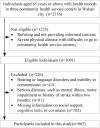Association of social support with cognition among older adults in China: A cross-sectional study
- PMID: 36225770
- PMCID: PMC9548585
- DOI: 10.3389/fpubh.2022.947225
Association of social support with cognition among older adults in China: A cross-sectional study
Abstract
Objective: This study aimed to examine the relationship between social support and its sub-domains and cognitive performance, and the association with cognitive impairment among older adults in China.
Design: A cross-sectional study.
Setting and participants: We included 865 community-based individuals aged 65 and above from Hubei province, China.
Methods: The level of social support was evaluated using the social support rating scale (SSRC). The Mini-Mental State Examination was adopted to assess cognitive function, and its cut-offs were used to determine cognitive impairment among the participants. Multiple linear regression models and logistic regression models were used to estimate the β and odds ratios (ORs) and their 95% CIs, respectively.
Results: The participants were divided into quartiles 1-4 (Q1-Q4), according to the total scores of SSRC. After adjusting for sociodemographic characteristics, lifestyle factors, and history of diseases, for MMSE scores, compared to these in Q1, the β of Q2-Q4 were -0.22 (-0.88, 0.43), 0.29 (-0.35, 0.94), and 0.86 (0.19, 1.53), respectively; For cognitive impairment, the ORs of Q2-Q4 were 1.21 (0.80, 1.82), 0.62 (0.40, 0.94), and 0.50 (0.32, 0.80), respectively. Considering SSRC scores as the continuous variable, per 1-unit increase, the β was 0.05 (0.02, 0.09) for the cognitive score, and the OR was 0.95 (0.92, 0.98) for cognitive impairment. In addition, higher levels of both subjective support and support utilization were related to better MMSE performance and lower risks of cognitive impairment.
Conclusion and implications: Among the older adults in China, as expected, there is a positive relationship between social support and cognitive performance, and high levels of social support, particularly in support utilization, were related to low risks of cognitive impairment. More social support should be provided in this population to improve cognitive function and reduce the risks of cognitive impairment.
Keywords: cognitive function; cognitive impairment; cross-sectional study; older adults; social support.
Copyright © 2022 Li, Guo, Deng, Zhao, Li, Yang, Li, Yan, Li, Li and Rong.
Conflict of interest statement
The authors declare that the research was conducted in the absence of any commercial or financial relationships that could be construed as a potential conflict of interest.
Figures
Similar articles
-
Living Environment, Built Environment and Cognitive Function among Older Chinese Adults: Results from a Cross-Sectional Study.J Prev Alzheimers Dis. 2022;9(1):126-135. doi: 10.14283/jpad.2021.59. J Prev Alzheimers Dis. 2022. PMID: 35098983
-
Empty nest but better off? Association between empty nest status and cognitive function among older adults with chronic diseases in rural China.BMC Geriatr. 2024 Oct 12;24(1):825. doi: 10.1186/s12877-024-05386-3. BMC Geriatr. 2024. PMID: 39395950 Free PMC article.
-
The relationship between mushroom consumption and cognitive performance among middle-aged and older adults: a cross-sectional study.Food Funct. 2023 Aug 14;14(16):7663-7671. doi: 10.1039/d3fo01101a. Food Funct. 2023. PMID: 37540100
-
The Relationship between Plasma Al Levels and Multi-domain Cognitive Performance among In-service Aluminum-exposed Workers at the SH Aluminum Factory in China: A Cross-sectional Study.Neurotoxicology. 2020 Jan;76:144-152. doi: 10.1016/j.neuro.2019.10.011. Epub 2019 Nov 10. Neurotoxicology. 2020. PMID: 31722248
-
Physiological Levels of Melatonin Relate to Cognitive Function and Depressive Symptoms: The HEIJO-KYO Cohort.J Clin Endocrinol Metab. 2015 Aug;100(8):3090-6. doi: 10.1210/jc.2015-1859. Epub 2015 Jun 8. J Clin Endocrinol Metab. 2015. PMID: 26052727
Cited by
-
Association between health literacy and dysphagia in the community-dwelling older population: a cross-sectional study.Aging Clin Exp Res. 2023 Oct;35(10):2165-2172. doi: 10.1007/s40520-023-02499-4. Epub 2023 Jul 28. Aging Clin Exp Res. 2023. PMID: 37505395 Free PMC article.
-
The relationship between multimorbidity and cognitive function in older Chinese adults: based on propensity score matching.Front Public Health. 2024 Sep 12;12:1422000. doi: 10.3389/fpubh.2024.1422000. eCollection 2024. Front Public Health. 2024. PMID: 39328989 Free PMC article.
-
Relationship between Social Support, Sarcopenia, and Cognitive Impairment in Chinese Community-Dwelling Older Adults.J Nutr Health Aging. 2023;27(9):726-733. doi: 10.1007/s12603-023-1973-2. J Nutr Health Aging. 2023. PMID: 37754212 Free PMC article.
-
Ultra-Early Screening of Cognitive Decline Due to Alzheimer's Pathology.Biomedicines. 2023 May 11;11(5):1423. doi: 10.3390/biomedicines11051423. Biomedicines. 2023. PMID: 37239094 Free PMC article. Review.
References
-
- World Health Organization . Risk Reduction of Cognitive Decline and Dementia. Who Guidelines (2019. - PubMed
Publication types
MeSH terms
Substances
LinkOut - more resources
Full Text Sources


